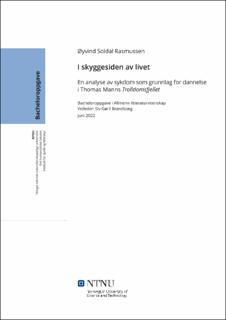I skyggesiden av livet: En analyse av sykdom som grunnlag for dannelse i Thomas Manns Trolldomsfjellet
Bachelor thesis
Permanent lenke
https://hdl.handle.net/11250/3005544Utgivelsesdato
2022Metadata
Vis full innførselSamlinger
Sammendrag
Denne oppgaven ser på hva som ligger til grunne for dannelsesprosessen til protagonisten Hans Castorp i romanen Trolldomsfjellet. I grunnlaget finner vi sykdom. Ved å tre inn i de sykes kongerike, tuberkulosesanatoret, blir Castorps idéverden og verdensanskuelse åpnet, hittil ukjente sider av livet blir belyst, og Castorps intellektuelle virksomhet aktiveres. Sykdomssfæren viser Castorp at hans tidligere forståelse av livet er ufullstendig. Lavlandets gode helse, dets sømmelige skikker og rasjonelle pliktfølelse, er bare en del av livets total. Den andre delen finner man i høylandet, i sykdommens lidelse, dens kjærlighet og lidenskap, dens likegyldige dødelighet. Dannelsen for Castorp består dermed av å ta til seg de nye inntrykkene sykdomssfæren tilbyr ham, å utforske og eksperimentere med de nye idéene det dionysiske i sykdommen introduserer han for. Drømmevisjonen i «Sne» kan i denne forstand anses som et toppunkt i Castorps dannelse, der hans nye idéer fra sykdommens sfære flettes sammen med det rasjonelle og måteholdne fra det friske lavlandet. This bachelors thesis analyses the personal growth of protagonist Hans Castorp in the novel The Magic Mountain. In its foundation one finds sickness. By stepping into the kingdom of the sick, the sanatorium, Castorp's intellectual world and worldview opens up and so far unknown aspects of life become visible. The society of the sick makes it clear to Castorp that his previous understanding of the world was incomplete. The good health of the "lowlands", its good manners and rational sense of duty, is only one part of life's total. The other part is found in the "highlands", in the suffering of sickness, its love and passion, its indifferent deadliness. Personal growth for Castorp consists of soaking up all the new experiences the society of the sick can give him, to explore and experiment with the new ideas discovered in the "highlands". This growth is viewed to reach its high-point in the chapter "Snow", where his new ideas from the kingdom of the sick is molded together with the rational and moderate from the kingdom of the well.
